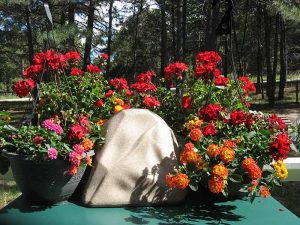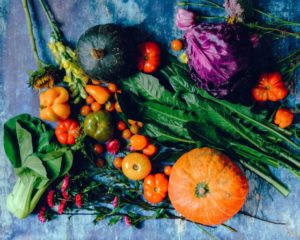
There are a plethora of Health Benefits of Gardening.
One of the obvious benefits is better flavor. Nothing beats the taste of sun-ripened tomatoes eaten right off the vine! Well, maybe the watermelon you have been nursing all spring and summer to eat during your 4th of July celebration!
Everyone can agree that homegrown produce does have the best flavor.
Another is a better outlook on life in general. And then, there are the nutritional benefits of being closer to the table so preservatives are not needed.
There are many health benefits of gardening. Let’s take a closer look at these.
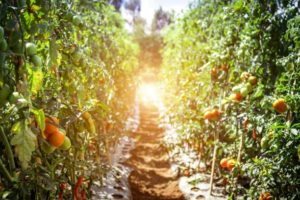
Nutrition
The nutrients in vegetables vary from one species to another, so if you have space, you will want a variety of plants. Is your diet good? If it is not, try to identify any nutritional deficiencies.
Here is a list of the most commonly grown garden vegetables and their primary nutrients:
Tomatoes – Vitamin C, A, K, and B6. Mineral content – potassium.
Cucumbers –
Zucchini – Vitamin A, B2, B3,B6. Mineral content – calcium, niacin, copper, zinc, and magnesium.
Corn – Vitamin C, B1, B9. Mineral content – magnesium and potassium.
Pumpkin – Vitamin C and A. Mineral content – potassium.
Watermelon – Vitamin C, A, and B6. Mineral content – calcium and magnesium.
Bell Peppers( Red are most nutritious) – Vitamin A, C, B2, B6, and E. Mineral content – niacin and potassium.
Jalapeno Peppers – Vitamin A and B6. The hot pepper’s best attribute is its capsaicin content which is good for pain and inflammation.
Cabbage – Vitamin K and C. Mineral content – manganese, potassium, magnesium, calcium, and folate.
Radish – Vitamin C. mineral content – calcium and potassium.
Kale – Vitamin C, A, and K. Mineral content – calcium, iron, and folate.
Swiss Chard – Vitamin C, A, and K. Mineral content – magnesium, iron, and potassium.
Potatoes – Vitamin C and B6. Mineral content – manganese, copper, potassium, phosphorus, and niacin. (Cautionary note – Never eat green potatoes)
Beets – Vitamin C and B9. Mineral content – iron, potassium, and manganese.
Carrots – Vitamin A, K, and C. Mineral content – Calcium and potassium.
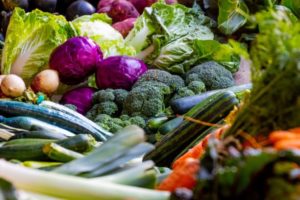
Herbs and Flowers
Growing flowers also has health benefits, and some are used as teas and have medicinal properties.
These are the most common herbs and flowers that are grown for the health benefits they contain:
Spearmint – Use leaves and flowers, either dried or fresh, for a tea that soothes upset stomachs and stuffy heads.
Oregano – used in Italian foods; it is an anti-viral herb.
Chives – use diced up fresh to garnish soups, salads, and baked potatoes. They help maintain good blood pressure.
Cilantro – use freshly minced on tacos, salsa, salads, and fish dishes. Cilantro is packed with antioxidants that combat AD, diabetes, and arthritis.
Lavender – Use flowers fresh or dried for a soothing tea that will help alleviate headaches. Use dry or new in a bath to relax after a hectic day.
Rose – Use dried as a tea to reduce the risk of diabetes, heart disease, and dementia.
Chamomile – Use dried flowers as a tea to reduce anxiety and stress.
Sweet Alyssum – Use dried flowers as a tea to relieve abdominal cramps and coughs.
Nasturtium – use leaves and flowers to relieve sore throats, coughs, and head colds.
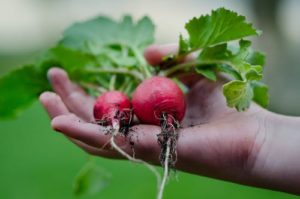
Physical Health
The very act of moving improves your wellbeing. Just walking around for twenty or thirty minutes can make a positive impact on your health. One of the most significant health benefits of gardening stems from issues of the sedentary life that most of us lead. This lifestyle is responsible, at least in part, to:
Heart disease
Breathing problems
Poor circulation
Back pain
Lack of libido
Poor immune systems
And Obesity, which is a national crisis in the United States.
Getting out in the fresh air can alleviate a number of these. Getting out and getting dirty can provide you with better tolerance to colds and viruses. Tending a garden can give the incentive to get out of bed to irrigate, weed, or harvest. While many call for banning all sun exposure, you still need some sun in your life. It provides vitamin D, which is critical to your absorption of calcium.
Getting out in the garden will literally help you breathe better. All of those beautiful plants do more than look pretty, they also taste good and produce oxygen. So while you are out there having a good time tending to your plants, they are tending to you too! You can bring some of that good oxygen indoors too. Some of the plants that do very well indoors are chives. They grow just like grass, and you can trim some off fresh in the kitchen whenever you want! Rosemary, oregano, sweet basil also do very well in an indoor area and can share irrigation.

Psychological Benefits
Psychologically speaking, gardening can help with depression, anxiety, stress, even insomnia! By getting outside, you can help with all of these conditions. If you can increase your heart rate for fifteen minutes, you can pull yourself out of a depressed state. While it sounds easy, hauling your ass out of bed for any reason when you’re down is anything but easy! Do it anyway, just for five minutes. Maybe I meant ten minutes. Well, you can’t just leave that one weed there….ok, perhaps I meant thirty minutes. You get the idea. You just have to start.
The serenity of gardening will suck you in and make your outlook on life better. When you get good at it, you can take fresh veggies to your friends or family or squirrel that shit away just for you! (Should I have warned you not to drink and read?) Whatever works for you.
Note:
Start with very hardy plants that are easy from an irrigation standpoint. That will tilt success in your favor from the start. The hardiest ones are:
Chives
Spearmint
Oregano
Roses (You can raise the miniature ones indoors)
Swiss Chard
As for watering your garden, if you are going to be away, there are irrigation remedies available for that.
We hope you have found this article informative and interesting. Visit our website for more informative articles and information on our portable automatic irrigation drip system kits. We are also have a free book, ” 101 ways to save on water in your landscape”.
